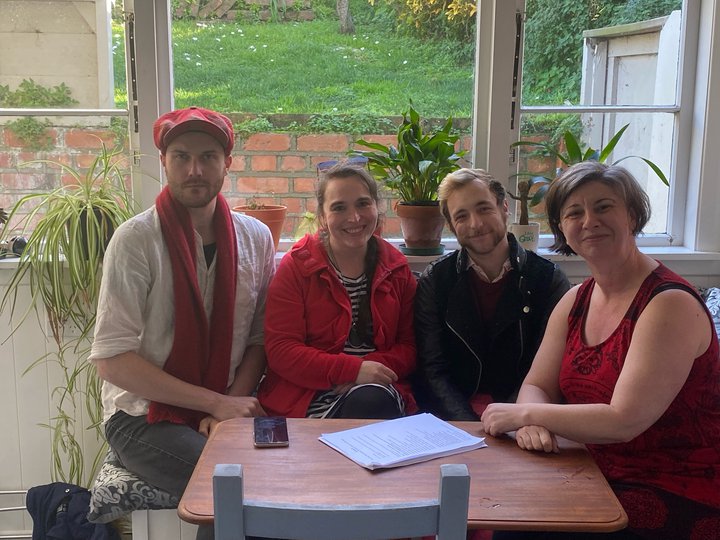31 July 2024
Jo Marsh's multimedia theatrical adaptation of Shakespeare's Hamlet opens at BATS Theatre on 21 August. Employing a combination of live action and multimedia, the classic play will be brought to life with just three performers and distilled into a one-hour performance.
I caught up with Jo talk about the production, her adaptation and creative process.

What can audiences expect from this production of Hamlet?
They'll experience something very new and very different. This is a multi-media version of Hamlet. You’re brought into this world of suspense and intrigue and surveillance, where everyone's being watched and Elsinor is crumbling around them
It's set in a high-tech dystopia, and what we've done is we've taken Hamlet - the three-and-a-half-hour extravaganza - and we've distilled it down into its ultimate elements and turned it into a one-hour performance. We use multi-media to create the impression of a high-tech dystopian future. We have one actor playing Hamlet and two actors playing all the other roles. To make that happen, we have a lot of video calls between different characters who are the same human playing those characters, talking to each other, keeping in the world of surveillance, where people are being watched all the time. It creates an atmosphere and a sense of foreboding and tragedy, which is Hamlet quintessentially,
Why choose Hamlet?
I think it's because Hamlet is very prevalent right now when you're talking about approaches to people with mental health issues. People who have society against them and yet we are all supposed to just carry on like nothing is going on and we are not supposed to express our feelings and we are not supposed to do this and that.
In today's world we are doing that more and more and mental health and mental illness is actually seen and recognised now. That's what this piece is also exploring. The notions of mental illness and the notions of what are called thought distortions. What is really happening? What is happening live and what is happening on screen? Which is the reality that we are living in. A lot of people with mental health issues, they conjure up notions in their mind about what is actually happening, when in reality it's a very different story. So we're working through those notions of mental health as well.
What was the adaptation process like? How do you distil three and a half hours of Hamlet into an hour?
I have loved Shakespeare - all Shakespeare - forever and a day. What happened with this Hamlet, it was also my own personal mental health journey. I did this a couple of years ago when I couldn't get a job. I was feeling really low, I had no projects on the go. It felt like I had nothing tangible to hold on to.
The one tangible thing I did have to hold on to was that I could put a project on, at some stage. So, I took one of my favourite Shakespeares - my other favourite is Richard III - but I took one of my favourite Shakespeare's and I read it four times. And I realised that in three and a half hours, the character Laertes, who is Ophelia's brother and Polonius's son, is in act one and then he's in act five. He goes off to France to learn how to be a sword fighter and be schooled for three whole acts. And then he comes home to be part of the plot for Hamlet’s demise.
I realised that there's a lot that's going on in the middle there, I'm not saying that the other three acts of Shakespeare's aren't important; there are some amazing speeches and an amazing discourse of the issues that are going on. However, I have made this the story of the Polonius family versus the Hamlet family and gotten rid of a lot of the exposition in the middle.
Don't fear Rosencrantz and Guildenstern are still there. Some of the most iconic speeches are still there. However, some things have been cut, for this particular storyline. Which is basically: an absolute tragedy has happened in a household and the son is trying to deal with that tragedy. Plus, the fact that his mother has married his father's brother, and everybody is trying to force him into doing things he doesn't want to do with his life.
The first thing: Hamlet, do not go to Wittenberg, stay here, don't go and enjoy your life and learn how to do things away from home. Stay here, stay home, stay and do this. And by the way, you need to go and marry this person, and you need to go and do this. And you need to act this way. You need to be this way.
When you don't have your own personal autonomy on how to move forward, you don't have your own sense of self. That's also what we're exploring. I know, it sounds like we're exploring a lot, but we are exploring a lot. But at the core, it’s Hamlet’s plight - he wants to do the right thing for his dead father, but he’s also being forced by his status and by his family, by society, to go on a path that he didn't want to go on in the first place.
In a lot of interpretations Hamlet can be seen as a whiny, shouty man, whereas for me, this is someone who is incredibly intelligent, really knows what they want to do with their life but unfortunately is being conspired against by external forces. That’s reason why I've distilled it down to these moments.
Why focus on Hamlet’s mental health?
Mental health is a big thing for many people. The fact that things like therapy etc are now seen as a positive thing in work environments, that mental health days are seen as positive things, people can now say” I'm off to therapy” or “I'm going to see my psychiatrist” or “I'm going to see my counsellor” and people don't balk at those moments. I also believe the more you talk about mental health, the more it becomes normal to express our thoughts and feelings to each other and we’re better able to seek the help that is required.
How does the multi-media element of the show enhance the storytelling?
It's not about setting the scene. There are no backdrops projected or anything like that.
Helen Vivienne Fletcher is playing Ophelia, Gertrude, Laertes, Rosencrantz and Guildenstern. She’s playing all these different characters. There’s a big conversation between Ophelia and Laertes and what we've done is put that through technology. Laertes is live on stage, speaking to Ophelia, who is the same actor, but projected on a massive screen behind them.
They're having a video call and we’ve called it Osric because Osric is one of the characters in the play [Hamlet] who isn't in our play. The back story is that Osric is Laertes’ best buddy and Horatio is Hamlet's best buddy. So we’ve got Osric Communications – our version of Zoom.
So we use the tech for those conversations and the whole scene between Ophelia and Hamlet, where they're being watched by Polonius and the king, they've “Osric” called into the scene and then shut themselves down so you can still see the little icon with the line through it, just like you can in Zoom calls when someone’s muted. Their names are still there, reminding you that they're being watched.
It is really exciting. For me, it's also about the whole creation of visual effects. To enhance the scenes. As I said, we don't want to project a set, but media will be utilised to create images which remind people of what's going on or what's being talked about.
The ghost is going to be terrifying because the ghost is only in Hamlet's mind in the play, so the ghost is never live on stage. It’s an amazing challenge for the actors to be interacting not only with themselves, but interacting with the screen and also interacting with other characters on screen.
In the set design, we have five different screens, each creating different elements in each of the scenes. It's a lot. It's wonderful. It's a challenge that SPLITelevision, who I'm working with are absolutely revelling in because it's something new, because they've never worked on such a multi - layered idea on multiple screens.
Is there anything else that you want tell us about your Hamlet?
I'm very much about access when it comes to shows, and the thing that I love about this particular piece is by distilling it down to an hour, you’re watching the quintessential essence of Hamlet without having to endure a two hour first half, a break and then another hour and a half which can be quite taxing on audience members. Especially in this day and age where we're used to 30-second Tik Toks and that kind of thing. Although this is a different world to the one we're in, it has fast-paced communication and the fast-paced notion of the world we’re creating.
I believe it’s a new way of looking at doing theatre as well by using multi-media not just as a backdrop, but actually as an interactive part of the performance.
What’s next for you?
After this?
Last year I did a show called Five Slices of Another Life which was five plays written and performed by neurodiverse and disabled members of the artist community. We’ve taken that development season and we're making that into a new season called, Among Other Things which is going to be at the Hannah Playhouse in October. It’s very exciting, working in a new place and new performers and definitely utilising a lot of the performers that I used in Five Slices. Not all the actors were available, so we’ve had to replace some roles which is really exciting because it means we're offering more opportunities for the disabled and neurodiverse communities. Part of my personal kaupapa is to create career opportunities for amazing performers that don't necessarily get opportunity because of their neurodivergence or because of their disability. We’re embracing that kaupapa for Hamlet as well.
Hamlet: Three Actors. One Hour. Denmark Will Never Be the Same is on for five shows only from August 21-25 at BATS Theatre. Bookhere.


